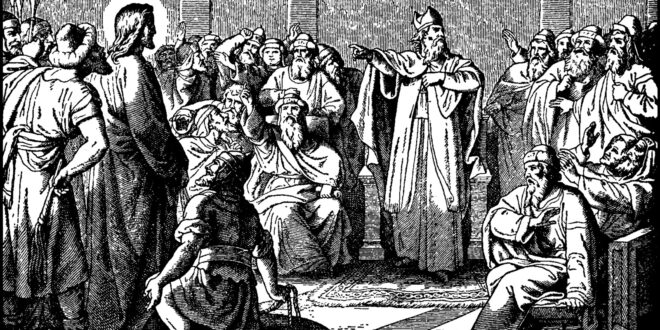John 11:49-50 And one of them, named Caiaphas, being the high priest that same year, said unto them, Ye know nothing at all, Nor consider that it is expedient for us, that one man should die for the people, and that the whole nation perish not.
Caiaphas, whose full name was Joseph Caiaphas, held a pivotal role in the religious and political landscape of first-century Jerusalem. This individual is often discussed in the historical sense, but there was so much more to him-but mainly-we know it was part of God’s plan and in fulfillment of the scriptures. As the Jewish high priest, he presided over the Sanhedrin—the council responsible for religious and civil matters. Obviously, there was a lot more to Caiaphas’ significance, his interactions with Jesus, and the timeless lessons we can glean from his life. Going forward, let’s delve into some of the key elements in this brief overview of Caiaphas’ role and the outline of the plan concerning the life of Jesus!
Caiaphas’ Role and Background
Caiaphas belonged to the Sadducee sect, and his appointment as high priest came through Roman governors. Only descendants of Aaron were eligible for this sacred office, yet Caiaphas and his father-in-law, Annas, assumed these positions. Their authority extended beyond religious duties; they maintained peace in Judea under the Pax Romana—a period of relative stability enforced by Rome.
Caiaphas and Jesus
Caiaphas’ most infamous moment occurred during Jesus’ trial. He orchestrated the plot to arrest Jesus, accusing Him of blasphemy. In John 11:49–50, Caiaphas unwittingly prophesied: “Ye know nothing at all, nor consider that it is expedient for us, that one man should die for the people, and that the whole nation perish not.” His words foreshadowed Jesus’ sacrificial death for humanity, and our Father’s plan for salvation of His children, using Christ as the sacrificial perfect Lamb.
Moral Reflections
Power and Compromise: Caiaphas wielded authority, balancing religious obligations with political pragmatism. His compromise led to Jesus’ unjust crucifixion. We, too, face choices between integrity and expediency. How do we use our influence?
Fear of Change: Caiaphas feared Jesus’ impact on the status quo. Fear often blinds us to truth and blindsides our moral compass. Are we open to transformation, even if it disrupts our comfort?
Relevance Today
Caiaphas’ story resonates in our modern world:
- Religious Leaders: Like Caiaphas, leaders today grapple with tradition, power, and relevance. Do they prioritize truth or self-preservation?
- Fear and Change: Fear of change still drives decisions. We must discern when fear hinders progress and stifles justice.
Caiaphas’ legacy — is a stark reminder that our choices ripple through history. As we reflect on his life, may we choose paths that honor justice, compassion, and love in all we do and say.
“Dear God, grant us wisdom to navigate power, courage to embrace change, and discernment to recognize truth. May we learn from Caiaphas’ missteps and seek justice, even when it challenges our comfort, in Jesus’ name we pray, Amen.”
 The Bottom Line, Ministries Christian News, Articles, & Poetry
The Bottom Line, Ministries Christian News, Articles, & Poetry 





WHAT AN EXCELLENT STUDY
Thank you so much Keith for your kind words.
Glad you enjoyed it.
God Bless~
Examining our heart as to the kind of person we are and how we influence others who come into contact with us needs to be taken seriously. We are a tool that either God or the devil will use to affect our lives and those who interact with us.
A prime example and warning in the decision this man made.
The Lord knew that this man was to be put in this position to carry out the mission to bring about our redemption. What we see as evil, the Lord meant it for the good to bring us to Himself.
Whatever it is we chose, it counts for all eternity.
Hi Cora,
Thank you for your words that ring absolute truth and bring the message further. Yes, all in God’s timing and will. We are vessels in the commission for Christ. All of us have a role, and a purpose to glorify and do the Will of the LORD.
Love your input my sweet friend, as always so appreciated.
God Bless~